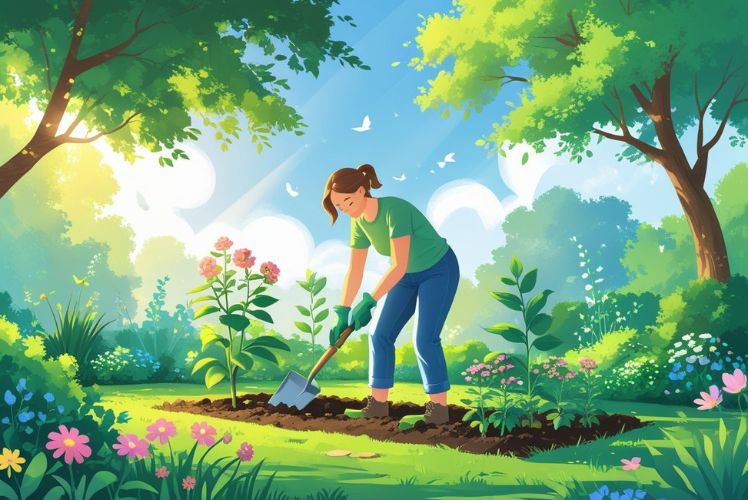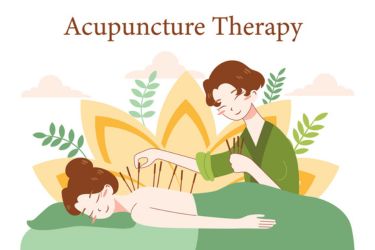Spending time in the garden does more than help us grow flowers and vegetables. Gardening can greatly improve our mental health by reducing stress, lifting our mood, and helping us feel more relaxed. Many people find that digging in the soil, planting seeds, and caring for plants offers a sense of calm and focus in a busy world.

Working outdoors with our hands gives us a break from screens and daily worries, while the fresh air and green spaces can boost our wellbeing. Gardening also provides gentle physical activity, which has been found to lower anxiety and help us feel healthier overall.
Key Takeaways
- Gardening lowers stress and boosts mood.
- Being outdoors and active supports mental wellbeing.
- Spending time in nature helps us feel calm and focused.
How Gardening Enhances Mental Health

Gardening offers a range of mental health benefits. When we spend time caring for plants, we can experience less stress, better mood, and may even see a reduction in symptoms of depression.
Reduction of Stress and Anxiety
Gardening can be a powerful way to help reduce stress and anxiety. When we are outdoors, surrounded by nature, our minds tend to feel calmer. Research has shown that gardening activities lower our stress hormone, cortisol, making us feel more relaxed.
Simple tasks like planting, digging, or watering give us a break from daily worries. This hands-on work helps us focus on the present moment, which can distract us from anxious thoughts. Several studies suggest that gardening can lead to significant drops in reported stress and anxiety.
Spending time in green spaces and engaging with nature can also make us feel connected to our environment. This connection has been linked with improved mental well-being. Gardening can provide a reliable way to manage stress, offering both immediate and ongoing benefits.
Improvement in Mood and Emotional Wellbeing
Many people notice their mood improves after spending time gardening. Nurturing plants, seeing them grow, and enjoying their colours can lead to a real sense of accomplishment. This can be especially important for those of us looking for consistent ways to boost our spirits.
Gardening can help increase positive emotions such as happiness and contentment. Being outside in the fresh air and sunlight helps lift our mood. Physical activity involved in gardening can also release endorphins, which are natural chemicals our bodies make to help us feel happier.
We might also enjoy the social side of gardening, such as chatting with neighbours or joining gardening groups. These interactions can boost our emotional wellbeing by reducing loneliness or isolation.
Alleviation of Depression Symptoms
Some research suggests that gardening may help ease symptoms of depression. Participating in gardening gives our days structure and purpose, which can be helpful if we are feeling low. The steady routine of looking after plants can offer comfort and hope.
Studies have reported fewer depression symptoms in individuals who garden regularly. The therapeutic benefits come from both the physical activity and the connection with nature. Gardening and mental health projects often use these factors to support people facing depression.
We can use gardening to set small, achievable goals. Completing work in the garden—even something as simple as planting a seed—can create a sense of progress that counteracts feelings of helplessness linked to depression.
Physical Activity and Its Impact on Mental Well-being

Physical activity plays a clear role in supporting mental health. Through movement and effort, both our bodies and our minds can experience real, measurable benefits.
The Role of Exercise in Reducing Anxiety
When we engage in physical activity, like gardening, our bodies release chemicals that help us feel calmer and more in control. These chemicals include endorphins and serotonin, which are linked to lowering stress levels. Gardening often involves repetitive tasks such as digging, planting, and weeding. These movements can be soothing and provide a break from anxious thoughts.
Spending time in our gardens gives us the chance to focus on simple, physical actions rather than worries. This physical distraction can lessen symptoms of anxiety. Studies have shown that even small amounts of daily activity can make it easier for us to manage stress. By working outdoors and connecting with nature, we can find a sense of peace and tranquillity that helps keep anxiety in check.
Boosting Self-Esteem and Confidence
Regular physical activity, such as gardening, gives us a chance to set goals and see results. Watching plants grow from seeds to flowers or vegetables can boost our sense of achievement. Meeting these small goals can help us build confidence in our abilities.
Gardening lets us take pride in our efforts. As we learn new skills, our self-esteem improves. Being able to care for living things strengthens our belief in our own capabilities. These positive feelings about ourselves often carry over into other parts of life.
It's not just about big achievements. Even small successes, like keeping a plant healthy, can help raise our confidence. Over time, these moments can add up and lead to a much better sense of self-worth.
Enhancing Life Satisfaction
Physical activity, especially when done outdoors in gardens, can make our daily lives feel more satisfying. Gardening encourages us to spend time outside, which has been linked to greater overall wellbeing. The fresh air, natural sunlight, and sights and sounds of the garden can all lift our mood.
Creating and maintaining a garden gives us a purpose. We see our hard work make a difference as our gardens thrive. This sense of responsibility and progress adds meaning to our days.
By staying active in our gardens, we often feel happier and more content with life. Knowing that we are doing something good for both mind and body – and enjoying the beauty of our surroundings – can greatly improve our overall life satisfaction.
Mindfulness and Creativity Through Gardening

When we get involved in gardening, it offers more than just physical activity. It helps us slow down, notice our surroundings, and express ourselves in creative ways.
Mindfulness Practices in the Garden
Gardening brings us into direct contact with plants, soil, and changing weather. Tasks like digging, planting, and watering encourage us to focus on each step. By paying attention to every movement, we naturally practise mindfulness. We become more aware of textures, smells, and sounds in the garden.
Simple activities, such as removing weeds or trimming leaves, can help us clear our thoughts. According to research, focusing on the present moment during gardening reduces daily stress. We find ourselves noticing small details: the warmth of the sun, the softness of soil, and the progress in our plants’ growth. This awareness fosters calm and helps us manage feelings of anxiety.
Gardening as a Form of Meditation
Many of us find that the repetitive actions involved in plant care are soothing. Repeating movements like raking, pruning, or watering can act like a moving meditation. Our minds settle as we focus on each task, tuning out distractions.
Some people use breathing exercises or quiet reflection while gardening. This creates a peaceful routine where we can let go of worries and simply be present. A few minutes spent quietly tending to plants, without screens or outside noise, refreshes our minds much like a formal meditation practice.
Regular gardening routines, even as little as 10–15 minutes a day, support mental wellness. Over time, gardening becomes a daily space for peaceful reflection, making it easier to balance our emotions and feel more grounded.
Fostering Creativity and Presence
Planning a garden or deciding which flowers to plant lets us express ourselves creatively. We choose colours, shapes, and layouts, crafting living spaces that reflect our personalities. This process gives us a sense of accomplishment and pride in our own designs.
Experimenting with plant combinations or trying a new arrangement can spark new ideas and boost creative thinking. Being present in the garden also helps us notice subtle changes, inspiring us to adapt and improve our surroundings.
For many of us, this creative process is both enjoyable and meaningful. It brings a sense of purpose and allows us to engage fully with each moment as we nurture and care for our garden.
Connection with Nature and Green Spaces

Spending time in gardens and green spaces is linked with better mental health and wellbeing. Being around plants and nature helps lower stress, lift our mood, and support both emotional and psychological health.
Benefits of Interacting with Plants
When we garden, we interact closely with plants every day. This hands-on contact gives us a sense of achievement as we watch seeds grow into flowers or food.
Caring for plants also encourages us to slow down and take mindful breaks from our busy routines. We may notice the details of leaves, colours, and scents — all of which help us feel present and calm.
Research has shown that gardening can reduce feelings of stress, anxiety, and depression. It also helps us feel connected to the natural world, which boosts our sense of purpose and belonging. The Mental Health Foundation notes that simple activities like watering, pruning, or just observing plants can make us feel relaxed and positive.
The Healing Power of Green Spaces
Green spaces include public parks, community gardens, forests, and urban trees. These places act as natural retreats, especially in cities where nature can be hard to find.
Studies highlight that spending time in green spaces supports our mental health by providing peace and a break from noise and crowds. Access to green environments has been linked to improved mood, lower stress hormones, and greater life satisfaction.
Green spaces also give us places for gentle exercise, fresh air, and social contact with others, which all help improve wellbeing. Just being in green surroundings can make us feel calmer and more focused, supporting our overall mental health.
Social and Community Aspects of Gardening
Gardening is more than just working with plants. It brings us together, helps us make friends, and creates ways we can support each other in our communities.
Building Social Connections
When we garden with others, we have a chance to talk, share experiences, and learn new skills. Being part of a gardening group or just working alongside neighbours often leads to meaningful conversations.
Research shows that these social interactions lower feelings of loneliness and can raise our mood. Regular contact in garden settings helps us build trust and a sense of belonging. Activities like seed swaps, garden tours, and shared workdays make it easier for us to connect with people of all ages and backgrounds.
Key social benefits of group gardening:
- More friendships
- Increased support
- Greater sense of community
Community Gardening Initiatives
Community gardens offer spaces where we can come together to grow food, flowers, or herbs. These gardens are often run by local councils, schools, or voluntary organisations. Many provide plots for individuals or families, while others are tended as a shared effort.
By working together in these spaces, we learn practical gardening skills and build stronger ties with others in our neighbourhood. Studies highlight that community gardening tackles social isolation, encourages physical activity, and can improve our overall wellbeing.
Some common features of community gardening projects:
| Feature | Purpose |
|---|---|
| Shared garden beds | Foster teamwork |
| Educational workshops | Teach gardening techniques |
| Social events | Bring people together |
| Volunteering opportunities | Develop responsibility |
Green Social Prescribing and Support Programmes
Green social prescribing allows doctors or health workers to refer us to gardening activities as a way to improve our mental or physical health. This form of support connects people with nature and community life, especially those facing stress, isolation, or mild to moderate mental health challenges.
These programmes might include gardening groups, nature walks, or skill-building sessions. Many are led by charities, NHS trusts, or local authorities. Support and encouragement are built into these initiatives, so it is easier for us to take part even if we need help.
Examples include local Master Gardener schemes, where experienced gardeners mentor newcomers, and support groups that meet regularly in community garden settings. This approach often improves mood, builds self-confidence, and adds to our sense of purpose.
Frequently Asked Questions
Gardening is linked to better mood, reduced stress, and improved social connection. Our involvement with plants and green spaces can support good mental health in ways supported by scientific evidence.
What are the psychological benefits of engaging in regular gardening activities?
We find improvement in focus, concentration, and memory when we garden. Regular engagement can also foster feelings of accomplishment, self-worth, and satisfaction. Having routine gardening tasks gives us purpose and structure.
How does gardening contribute to reduced stress levels in individuals?
Gardening allows us to move our bodies and spend time outdoors, both proven to reduce stress. The physical activity helps lower cortisol, the stress hormone, while contact with nature calms our minds. Simple, repetitive gardening tasks can also be meditative.
Can horticultural therapy be considered as a tool for improving mental health, and on what grounds?
Horticultural therapy uses plants and gardening as therapeutic tools. It helps people build coping skills, express emotions, and improve mood. Professional evidence shows that this therapy can support those with mental health conditions, providing safe and structured activities.
What impact does gardening have on mood and emotional well-being?
When we garden, our bodies release dopamine, a hormone linked to feeling good. We tend to feel more relaxed and happier after spending time among plants. Gardening can increase our overall satisfaction with life.
How does immersing oneself in gardening activities aid in combating depression and anxiety?
Gardening can give us regular, low-pressure exercise and help break cycles of negative thinking. The act of nurturing plants gives us small wins, helps with attention, and can distract from anxiety and sadness. Spending time in green spaces is associated with fewer symptoms of depression.
In what ways does community gardening enhance social interaction and mental health?
Community gardens offer us chances to meet others with similar interests. Sharing space and working towards common goals can reduce feelings of loneliness. We often experience stronger connections, greater support, and increased happiness in group gardening settings.





















